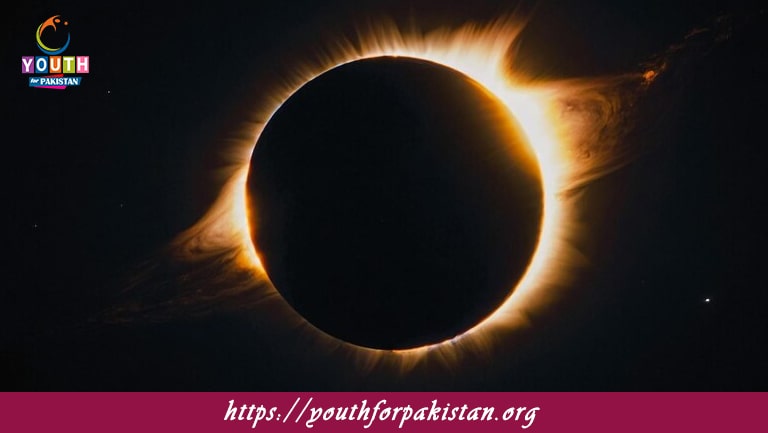Welcome to the Solar Eclipses MCQs with Answers. In this post, we are sharing Solar Eclipses Multiple Choice Questions and Answers in Astronomy section for various competitive exams in Pakistan. Each question offers a chance to enhance your knowledge regarding Solar Eclipses online MCQs Test.
During a solar eclipse, what is the term for the shadow cast by the Moon?
a) Penumbra
b) Umbra
c) Antumbra
d) Perigee
What is the primary cause of a solar eclipse?
a) The Moon passing between the Earth and the Sun
b) The Earth passing between the Moon and the Sun
c) The Sun moving behind the Earth
d) The Moon moving behind the Earth
Which type of solar eclipse occurs when the Moon only partially covers the Sun?
a) Total solar eclipse
b) Annular solar eclipse
c) Partial solar eclipse
d) Hybrid solar eclipse
What is an annular solar eclipse?
a) When the Moon completely covers the Sun
b) When the Moon is too far from Earth to cover the Sun completely
c) When the Sun is blocked by the Moon’s penumbra
d) When the Moon is visible as a bright ring around the Sun
Which eclipse is known as the “ring of fire”?
a) Total solar eclipse
b) Partial solar eclipse
c) Annular solar eclipse
d) Hybrid solar eclipse
What is the name of the darkest part of the Moon’s shadow during a solar eclipse?
a) Penumbra
b) Antumbra
c) Umbra
d) Perigee
During which type of solar eclipse does the Sun appear as a crescent?
a) Total solar eclipse
b) Annular solar eclipse
c) Partial solar eclipse
d) Hybrid solar eclipse
What is the term for a solar eclipse that has both total and annular phases?
a) Partial eclipse
b) Total eclipse
c) Hybrid eclipse
d) Penumbral eclipse
How often do solar eclipses occur on average each year?
a) Once
b) 2 to 5 times
c) 10 to 12 times
d) 20 to 30 times
What is the main difference between a total solar eclipse and a partial solar eclipse?
a) The Moon’s distance from Earth
b) The position of the Moon relative to the Sun
c) The duration of the eclipse
d) The type of shadow cast
What happens to the temperature during a total solar eclipse?
a) It increases significantly
b) It remains unchanged
c) It decreases significantly
d) It fluctuates wildly
What is the path of totality during a total solar eclipse?
a) The area where the partial eclipse is visible
b) The path where the Sun is completely covered by the Moon
c) The area where only the penumbra of the Moon’s shadow falls
d) The entire Earth’s surface
Which ancient civilization recorded solar eclipses?
a) Greeks
b) Egyptians
c) Chinese
d) Mayans
What phenomenon occurs when the Sun, Moon, and Earth are in perfect alignment during a solar eclipse?
a) New Moon
b) Equinox
c) Solstice
d) Apogee
What is the term for the partial shadow of the Moon that causes a partial solar eclipse?
a) Umbra
b) Antumbra
c) Penumbra
d) Perigee
When does a total solar eclipse occur?
a) When the Moon is in its new phase and closer to Earth
b) When the Moon is in its full phase and far from Earth
c) When the Earth is between the Sun and Moon
d) When the Sun is between the Earth and Moon
Which eclipse is most likely to be visible from a specific location on Earth?
a) Total solar eclipse
b) Partial solar eclipse
c) Annular solar eclipse
d) Penumbral lunar eclipse
What is the maximum duration of totality in a solar eclipse?
a) About 1 minute
b) About 5 minutes
c) About 10 minutes
d) About 7 minutes
Which type of eclipse occurs when the Moon is at apogee?
a) Total solar eclipse
b) Partial solar eclipse
c) Annular solar eclipse
d) Hybrid solar eclipse
What causes the Sun to look like a “ring of fire” during an annular eclipse?
a) The Sun’s light shining through the Moon’s umbra
b) The Sun’s light shining through the Moon’s penumbra
c) The Moon is too far from Earth to completely cover the Sun
d) The Moon is too close to Earth to completely cover the Sun
Which type of eclipse is visible over a larger area?
a) Total solar eclipse
b) Partial solar eclipse
c) Annular solar eclipse
d) Hybrid solar eclipse
What is the main safety concern during a solar eclipse?
a) Temperature drop
b) Increase in radiation
c) Viewing the Sun directly without protection
d) Increased risk of wildfires
How often does a solar eclipse occur at any given location?
a) Every year
b) Every 6 months
c) Every 18 months
d) Every 10 years
What celestial event precedes a total solar eclipse?
a) The Moon moving into the Earth’s penumbra
b) The Sun entering the Earth’s shadow
c) The Moon covering the Sun’s disk completely
d) The Moon covering part of the Sun’s disk
What is the “diamond ring effect” in a solar eclipse?
a) The appearance of the Sun as a bright ring
b) The first and last moments of totality when beads of sunlight shine through lunar valleys
c) The appearance of the Moon as a bright ring
d) The effect of sunlight refracted by the Earth’s atmosphere
During which solar eclipse phase does the Sun appear as a crescent?
a) Total solar eclipse
b) Annular solar eclipse
c) Partial solar eclipse
d) Hybrid solar eclipse
What is the maximum number of solar eclipses that can occur in a year?
a) 1
b) 2
c) 4
d) 7
Which part of the Moon’s shadow causes an annular solar eclipse?
a) Penumbra
b) Antumbra
c) Umbra
d) Perigee
What effect does a total solar eclipse have on the Sun’s corona?
a) It becomes less visible
b) It becomes more visible
c) It disappears completely
d) It causes a temporary increase in brightness
How long can the total phase of a solar eclipse last?
a) A few seconds
b) About 1 minute
c) Up to 7 minutes
d) About 30 minutes
Which celestial body’s shadow causes a solar eclipse?
a) The Earth
b) The Moon
c) The Sun
d) The stars
How often do total solar eclipses occur?
a) About once a year
b) About once every 2 years
c) About once every 5 years
d) About once every 10 years
Which of the following is NOT a type of solar eclipse?
a) Total eclipse
b) Partial eclipse
c) Hybrid eclipse
d) Super eclipse
What is the term for the effect when sunlight shines through lunar valleys during a total solar eclipse?
a) Diamond ring effect
b) Baily’s beads
c) Solar flares
d) Corona
What causes the sky to darken significantly during a total solar eclipse?
a) The Sun being completely covered by the Moon
b) The Moon’s penumbra passing over the Earth
c) The Sun’s rays being refracted by the Earth’s atmosphere
d) The Earth’s shadow falling on the Moon
How does a solar eclipse affect the behavior of animals?
a) They become more active
b) They exhibit normal behavior
c) They become confused or behave unusually
d) They go into hibernation
Which of the following best describes the alignment of the Sun, Moon, and Earth during a solar eclipse?
a) Earth is between the Sun and Moon
b) Moon is between the Sun and Earth
c) Sun is between the Moon and Earth
d) Earth is between the Moon and Sun
What is the significance of the “shadow bands” observed before and after totality?
a) They are caused by the Moon’s shadow interacting with the Earth’s atmosphere
b) They are a result of solar radiation bending through the Earth’s atmosphere
c) They are related to the Sun’s magnetic field fluctuations
d) They are created by the Earth’s surface reflectivity
Which of the following is true about hybrid solar eclipses?
a) They are a combination of total and annular eclipses
b) They occur only once every 100 years
c) They can only be observed from space
d) They have no significant differences from partial eclipses
What is the typical duration of a partial solar eclipse?
a) A few minutes
b) About 30 minutes
c) Several hours
d) 1 hour
If you are interested to enhance your knowledge regarding Physics, Chemistry, Computer, and Biology please click on the link of each category, you will be redirected to dedicated website for each category.










